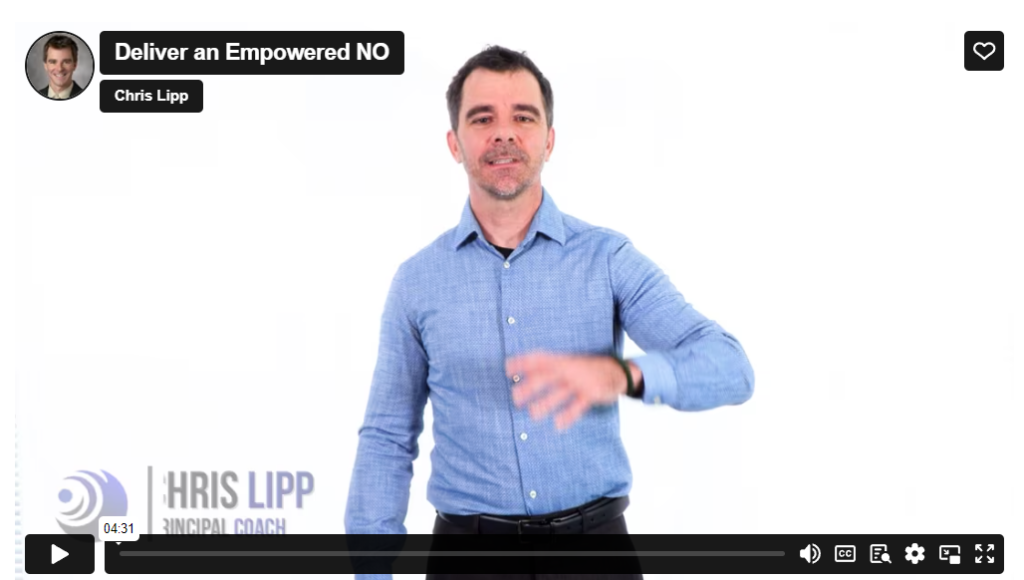Have you ever said yes to a request when you actually wanted to say NO? I’ve done this a million times. I’ve had situations where clients come up to me and asked me to work through the holidays. Of course I want do my best for my clients, but there are situations where I also want to be with my family.
I’ve actually said yes a few times when I wanted to say NO, and it was unnecessary because obviously everybody else is taking vacation. And afterwards I felt really bad. Why did I spend my holidays on my work rather than with my family?
Professor Vanessa Patrick wrote a book called The Power of Saying No. I love this book because it shows so much insight into why we say yes and how we can say NO, not just in an offhanded manner, but in a very empowering way that makes us feel good and makes us more respected.
What Professor Vanessa Patrick found was one reason we often say yes is we want to maintain our relationships. Being social creatures, we feel anxiety saying NO because of that risk to relationships. We are fundamentally cooperative.
But an interesting point that she also showed in her research is that when people evaluate each other, we tend to evaluate each other through either the lens of being warm or competent. In other words, when you look at somebody in a situation, you’re either thinking about them as warm or competent based on whatever is relevant in that moment. Rarely do we try to evaluate somebody simultaneously as warm and competent.
Yet when we are being evaluated by others, we want to be seen as BOTH warm and competent. So there’s this disconnect in the way that people see us versus the way that we want to be seen. We don’t need to struggle to be both all the time. That was one of the things she found in her research.
What she also found is when we say NO, one of the reasons we might feel uncomfortable saying NO is because we say NO in a disempowered way. What does a disempowered NO sound like? There might be a situation where somebody puts a request on you and you might say something like, “oh, well, you know, I really can’t tonight I have to take the kids out.” Or, “I really need to check with my partner before making a decision.”
In all these situations, a lot of times what we’re saying when we say NO is we’re saying, I can’t do it.
But why is that so bad?
The problem with I can’t do it is ultimately we’re blaming something external. We’re blaming the situation, we’re blaming other people in our life. But ultimately what we’re saying is because of situational constraints around me, I can’t do it.
Well, what does that say?
That says that I’m disempowered in my life, that the situation controls me. I don’t control my life. You might say, I can’t do it tonight for whatever reason, but by saying the words, I can’t, what you’re really saying is, I’m not in control of my life. And it’s called a disempowered NO. It’s not really a clean way of saying NO.
People who receive that kind of NO feel it’s less persuasive, less committed, and ultimately doesn’t look like you’re empowered. So it earns less respect.
Okay, so how do we say an empowered NO?
In research, people were given a chocolate cake and they refused the chocolate cake. Participants watched these people refusing chocolate cake. And half the people who refused chocolate cake said, I can’t eat chocolate cake. The other half of the people who refused chocolate cake said, I don’t eat chocolate cake. Do you hear the difference?
When we say I can’t, we blame external circumstances. We’re making an excuse.
When we say I don’t, that I don’t is coming from our inner principles and values. In other words, it’s coming from our identity. When people receive a NO from you and you’re using the words I don’t – I don’t eat meat. I don’t do this. I don’t stay late at work, etc., what you’re communicating is that you’re internally driven, so you are powerful and you are seen as more persuasive, and you’re seen as more committed to yourself.
These are things that people respect.
So the next time you get into a situation where you feel uncomfortable saying yes and you want to say NO, don’t try to escape by hiding behind some excuse like, I can’t tonight, instead say I don’t. Make it a principle, make it a value. I don’t stay late because I spend this time with my family.
People will respect you more, you will feel more empowered in that process.

